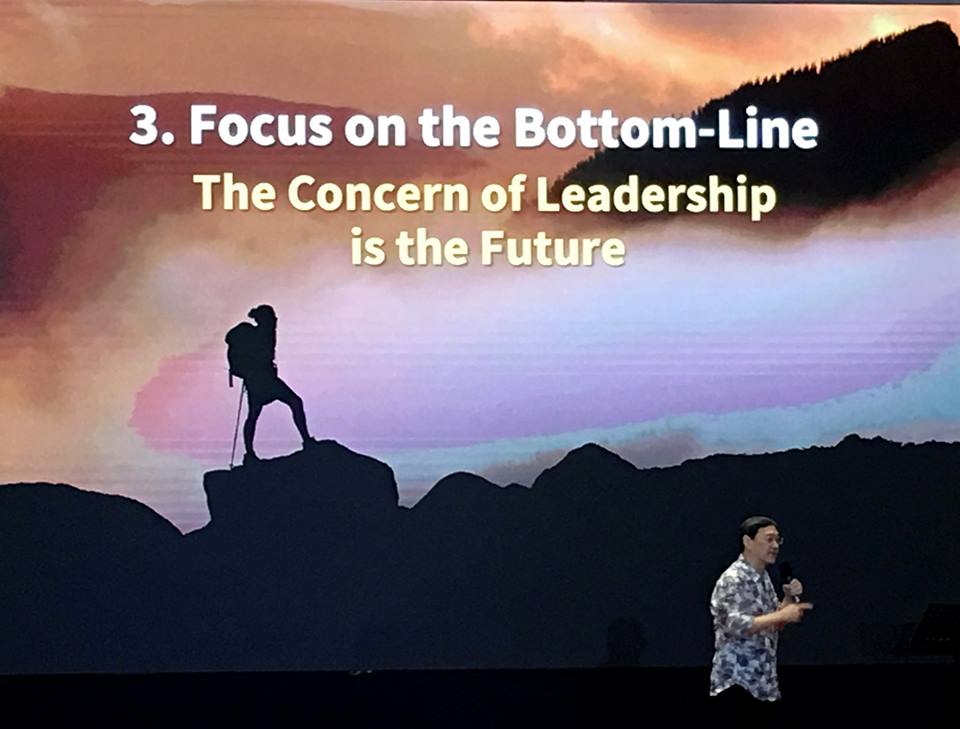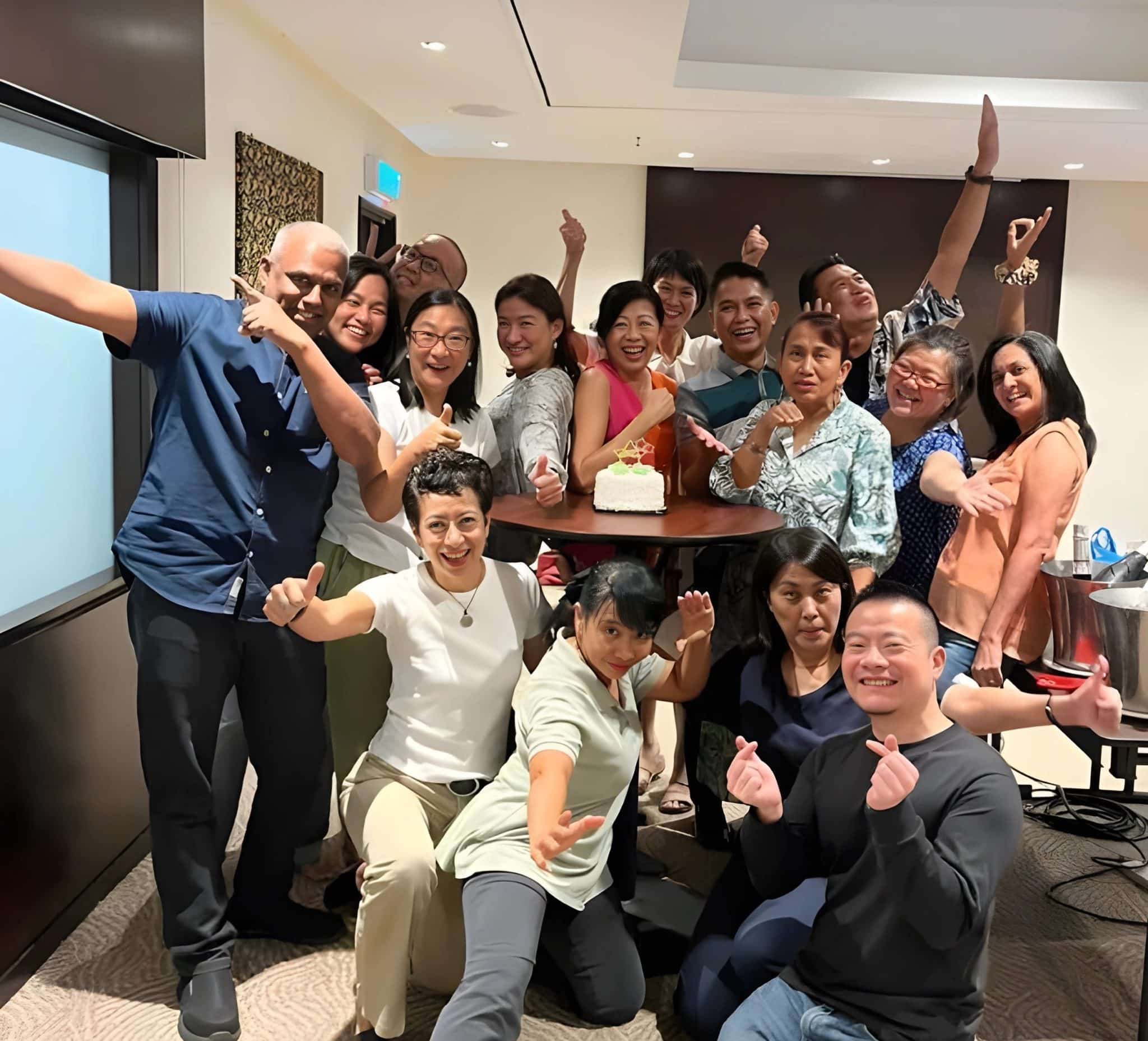What are the makings of a good leader? Here are Reverend Edmund Chan’s five essentials
Reverend Edmund Chan // January 27, 2019, 9:00 am

Reverend Edmund Chan of Covenant Evangelical Free Church giving his take on what makes a good and godly leader. Photo from LoveSingapore's Facebook page.
There are no church problems.
Because what we really have are people problems.
Explore deeper and you don’t really have people problems but heart problems.
And when you explore the heart problems, what we really have is obedience-to-God problems.
That’s the nature of the heart, right? The heart of the heart problem is an obedience problem. When you deal with an obedience problem, we are dealing with a faith problem.
If your effort is in building the team, you have less and less battles to fight.
The apostle Paul, in the book of Romans, joins faith and obedience together, and he calls it the “obedience of faith” (Romans 1:5).
When you consider the faith problem, it is a spiritual maturity problem.
And when you consider the spiritual maturity problem, it is a discipleship problem.
And here’s the thing: At the heart of a discipleship problem is a leadership problem.
That’s why leadership is so essential in the life of a church – it is crucial for the robust faith and vitality in the church.
Everything stands or falls on leadership.
Recently, I asked myself: If I boil everything down to the irreducible minimum, what are the essentials of leadership, other than the spiritual foundation of the Word of God, prayer, the Holy Spirit and the Spirit life?
What I’ve found essential are the following five points:
1. Determine the battle line
The capacity of leadership is in the team.
There are three things I say about the battle line:
- Don’t fight
- You must fight
- Don’t just fight
First: Don’t fight, because not every battle is worth fighting. Determine what hill you want to die on.
Second: But there are some battles you must fight. For the truth, you must fight; for core values, you must fight.
There are some battles you must fight. For the truth, you must fight; for core values, you must fight.
In my church, I’m a gentle and soft-spoken leader, but there are some fundamental lines that cannot be crossed. There’s a phrase in Mandarin that translates in English to: “If you cross the line, I will fight you in battle” and my staff will tell you that about me.
Why? Because there are some battles the leader must have the courage and the clarity to fight.
Now here’s the third thing I want to say about battles: Don’t just fight. Build the team. Because if your effort is in building the team, you have less and less battles to fight.
And also when the battles come, you are not fighting alone; you have a team with the same DNA. Focus your attention on building the team, for the capacity of leadership is found in the team.

Almost 800 participants from 110 churches and 46 Christian organisations came together to attend the 2019 LoveSingapore Summit, themed “Whatever It Takes”. Photo from LoveSingapore’s Facebook page.
2. Examine the fault lines
The capital of leadership is trust. I have seen senior pastors who have lost their ministries and their church leadership because they failed to recognise the erosion of trust.
And I’m not talking about inexperienced pastors or small, struggling churches, who fight with this loss of trust. I’m talking about experienced senior pastors in megachurches.
The capital of leadership is trust. I have seen senior pastors lose their church leadership because they failed to recognise the erosion of trust.
There was a senior pastor with a 6,000-strong church who failed to pay attention to the erosion of trust in the leadership. Eventually there was a big leadership crisis and he was voted out.
And these are not isolated cases. I’ve seen it in different countries, different cities – it happens over and over again – pastors who lose their ministries because they failed to build trust.
Let me give you a practical idea. There are many ways to build trust, but one of the things that I do with my board at Covenant Evangelical Free Church is have a weekly morning prayer at 6am on Saturdays, on top of our monthly prayer meeting.
Because those who pray together, stay together.
So besides the board meeting where we discuss, deliberate and sometimes debate, it is at the Saturday prayer meeting where our hearts are met together in the presence of God.
It also builds a leadership resonance and not just a leadership agreement. I’ve learnt as a leader that there’s a huge difference between leadership agreement and leadership resonance.
And as leaders, we want to build resonance.
3. Focus on the bottom line
Pursue the bottom line, because the concern of leadership is the future. The bottom line is not just some profit margin or size or growth, the bottom line is the future.
In leadership, leaders are brokers of hope; once a leader loses hope, he has lost his leadership.
The terrain of leadership is the future. Leaders live in the future and they have an idea of the future. That’s why in leadership, leaders are brokers of hope; once a leader loses hope, he has lost his leadership.
Leadership is centred in the promises of God, centred in the presence of God, and centred in the sense of destiny.
Develop the hope and never, never lose it. Because God is at work in building the sense of the future that He is calling us to. We are not just aiming for the future or hoping for the future; leaders in God create the future by faith.

Senior pastors must focus on equipping not just the next generation of leaders, but also the ones that will take over from their successors. Photo from LoveSingapore’s Facebook page.
That’s why in practical outworking, the emphasis on the third generation is so important.
Here’s the principle: The test of leadership is not found in the second generation; the test of leadership is found in the third generation.
Christianity-on-steroids is when everything is pumped up and there is no sustainability.
In other words, as leaders, we are aiming not just to finish well, we are aiming for sustainability.
I knew a megachurch in California that dwindled from 1,200 people to 280 people after their senior pastor left for another calling.
In Chicago, there was another church that had about 1,600 to 1,700 people. The senior pastor left and the church dwindled to 680. Almost 1,000 disappeared.
If all things are going smoothly only as long as the senior pastor is there, I call it Christianity-on-steroids, because everything is pumped up and there is no sustainability.
A true leader aims for sustainability in the future. That’s why the future is so important as a leadership concern.
4. Tackle the pipeline
The conduit of leadership is empowerment. The pipeline is the systems and structures that empower the staff and the church to be aligned together in a movement.
If you don’t have the systems and the structures, you are like a Ferrari stuck in traffic.
Churches unfortunately very often are over-managed but under-led.
Now here’s the caution concerning systems and structures: They are needed, they are helpful, but be careful of over-control – that is, the tyranny of bureaucracy.
Churches unfortunately very often are over-managed but under-led. We’re not just talking about management, which is needed; we’re talking about leadership, which is crucial. And in leadership, be careful that we don’t over-manage and over-control.
Why?
Let me explain this very briefly. As the organisation grows, it grows in complexity. The way leaders work with complexity is to put in controls, but the danger is to over-rely on this control or compliance mode, which kills creativity and empowerment.
So alignment is important, but the danger is, we’re all aligned doing it as a cookie cutter thing and we fail to think – not just what we’re doing or how we’re doing but, more importantly, why we’re doing what we’re doing.
Leaders major on the “why” question.
5. Honour the plumb line
Honour the plumb line because at the heart of it, you’ve got to realise that the challenge of leadership is transformation.
When we talk about transforming ourselves as leaders, transforming the church, transforming the culture, transforming the nation, that’s just one part of the transformation – the existential part.
Leadership is not easy – we need the grace of God.
But there’s a theological, eternal part of transformation that we as leaders must understand. At the end of the day, there is a spiritual dimension to leadership.
It’s about Christlikeness, conforming to the image of the Son.
The plumb line, the standard and the absolute for spiritual leadership – different from secular leadership – is that the transformation of the church is unto Christlikeness.
In other words, I humbly submit to you that leadership is all about growing unto Christ.
It’s all about Jesus. It’s not about the size of the organisation, effectiveness of the organisation or the buzz.
Let me conclude by saying, as you think through very carefully the essentials of leadership along these five parameters, I want you to realise that leadership is not easy – we need the grace of God.
May the Lord help us in the spirituality of leadership.
This article is based on a talk given by Reverend Edmund Chan at the 2019 LoveSingapore Summit.
We are an independent, non-profit organisation that relies on the generosity of our readers, such as yourself, to continue serving the kingdom. Every dollar donated goes directly back into our editorial coverage.
Would you consider partnering with us in our kingdom work by supporting us financially, either as a one-off donation, or a recurring pledge?
Support Salt&Light



